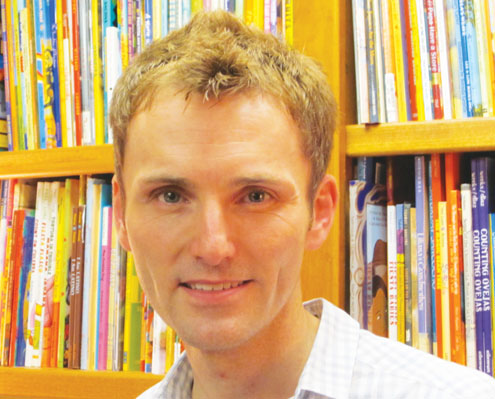Santa has his elves, Sherlock Holmes has Dr. Watson and, as it turns out, even Big Bird sometimes needs a little help from his friends. Jamie Naidoo, a professor for UA’s School of Library and Information Studies, is ready and able to provide it.
Naidoo was recently called to New York by the makers of the popular children’s television program Sesame Street as a consultant for his expertise in Latino heritage and Latino children’s literature.
“Basically, I just received an email from Sesame Street saying they had read my research and my blog on the subject, and they wanted me to come consult for them,” Naidoo said. “I didn’t believe that it was real at first, so I just ignored it. Eventually, they sent me another email, and I figured this had to be legit, so I gave them a call and they flew me on up.”
Naidoo said the show currently has one Hispanic character, the puppet Rosita. He was asked by instructors to review past episodes that included Rosita or other Latino elements to make sure they accurately portrayed the diversity and richness of the demographic. Naidoo also provided advice on how to expand Rosita’s character and incorporate more such roles, both human and puppet, in future episodes, books and product lines.
“They wanted to know things that I thought were great and that they should continue to do, and they wanted to know what things I thought could be misconstrued as stereotypical or disrespectful — things I recommended they should change moving forward,” he said.
Naidoo’s recruitment was not a one-off job; he said Sesame Street producers want him to continue to provide ongoing consulting work on specific questions they send him via email and phone.
His passion for respectful portrayal of Latino culture is no temporary gig, either. Naidoo said he first took interest in the subject while working as a librarian in Pelham, Ala., at a school with a significant Hispanic population. Several teachers and administrators did not have a full understanding of the unique needs and issues that applied to the children, as many of them were recent transfers to the area.
“I felt sorry for those children trying to navigate a new culture,” he said, “and I wanted to help them by promoting understanding and breaking down the stereotypes with which people looked upon them. So I was determined to make that a focus as I continued into my doctoral studies.”
His focus has not gone unnoticed or unappreciated by his colleagues.
“Dr. Naidoo’s work in the field of Latino children’s literature, literacy advocacy and library service to Spanish-speaking people is immeasurable,” Monica Brown, an award-winning children’s author and English professor at Northern Arizona University, said via email, “He is one of our greatest advocates, and his work has had far reaching influence on librarians, scholars and most importantly, children.”
Gail Sheldon, Director of Oneonta Public Library, said Naidoo’s passion for his work has significantly deepened her personal investment in the subject.
“Dr. Naidoo has worked tirelessly to promote library services for the Latino community,” she said in an email. “As a public library director and a former student of Dr. Naidoo, I have found that he has influenced my interest in actively developing and promoting library services to the Latino community in my area. His devotion to this work is truly inspirational.”
Last week, Naidoo hosted the fourth National Latino Children’s Literature Conference at Amelia Gayle Gorgas Library. Writers, illustrators, teachers, librarians and writers, including Brown, came from around the country came to “discover how to meet the informational and literacy needs of Latino children” and “explore how to make intercultural connections and serve this rapidly growing, uniquely diverse population,” according to a description on the Conference’s website.
For Naidoo, whether the forum is a conference or television program, the message remains the same.
“We need to provide opportunities for Latino children to see more positive representatives on TV, in books and throughout our culture and promote better understanding of their culture,” he said. “They’re people, just like you and me. Get a chance to learn about the people besides you before you judge them or stereotype them.”







